AFLW: Despite the AFL’s new concussion protocols being put under the microscope, Carlton coach Daniel Harford has defended a dangerous-looking tackle
Despite Sarah Hosking returning to the field, will Blue Maddie Prespakis have a case to answer for her spear tackle? Her coach doesn’t think so. SEE THE VIDEO.
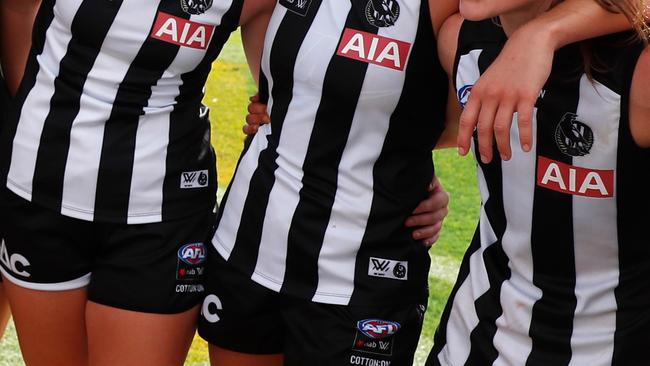
AFLW
Don't miss out on the headlines from AFLW. Followed categories will be added to My News.
Daniel Harford doesn’t think his star midfielder Maddie Prespakis has a case to answer over her momentum changing spear tackle on Sarah Hosking.
The second quarter tackle left Hosking in the rooms getting tested for concussion and swung the momentum in Carlton’s favour after the Tigers kicked the first three goals of the game.
Speaking after the Blues’ thrilling five-point win, Harford said he was more frustrated the umpire paid a free kick against Prespakis at the time.
Watch every match of the 2021 NAB AFLW Competition LIVE on Kayo. New to Kayo? Get your free trial now & start streaming instantly >
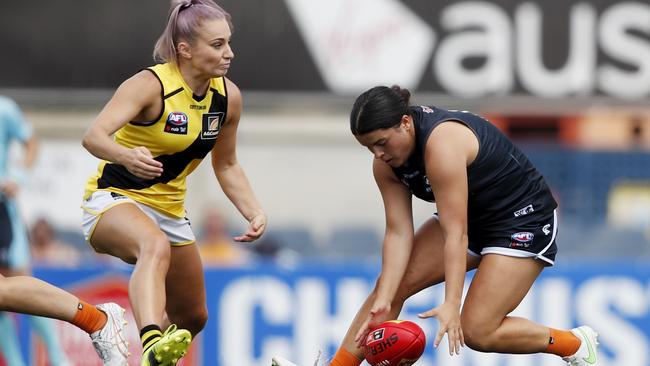
“I must admit we saw that in the box and thought it was a tackle with momentum and there was nothing wrong with it, so we were annoyed with the free kick,” Harford said.
“I haven’t seen it up close, but we didn’t have too many problems with how it was handled from Mads’ end.
“Mads is a bull, and she cops a fair bit every week, she actually cops more than she gives, we don’t get a lot of support for her from the fraternity.”
Harford said, because Hosking returned to the field, he thought Prespakis, who was reprimanded for rough conduct in Round 2, had no case to answer for.
“She’s a physical player, a grunt player, and that’s part of her makeup and why she’s so good because she competes so hard,” he said.
“I wouldn’t think she’s in trouble, Sarah came back on didn’t she?”
Hosking will be monitored during the week for any residual concussion and under the new AFLW and AFL rule would stand to miss next week’s game if there are symptoms.
The Blues have kicked just one goal in first quarters this season and another slow start led to an almighty spray at the first break from Harford.
Sarah Hosking will take part in the second half after passing a concussion test following this tackle from Maddy Prespakis.#AFLW | #AFLWBluesTigers pic.twitter.com/LBZ4IfC9Lk
— AFL Women's (@aflwomens) February 20, 2021
“The PG version would say please try harder, we didn’t have our heads in the game in the first quarter for whatever reason,” he said.
“The heart rate was elevated for a fair portion of that match. The start didn’t go to plan and then we got ourselves back into the contest with some really good contest and style and effort.
“In the last quarter the scoreboard pressure came on and we just clung on, it wasn’t very impressive.”
Darcy Vescio played her best game of the season, kicking three goals in a blistering third quarter performance.
“No doubt it was her best game of the season,” Harford said.
“She should’ve kicked two in the first quarter and had five to three-quarter time.
‘I had no idea where I was’: Doc’s warning after scary concussion
- Liz Walsh
Ailish Considine “came to” sitting on the bench at Blacktown and had no idea how she got there.
The dying minutes of the final term of the game against Greater Western Sydney on February 7 were playing out in front of the Adelaide Crows Irish import.
Twenty minutes earlier in the third quarter, Considine was laid out, face down and motionless on the oval after she’d been crudely tackled and hurled headfirst into the turf.
The game was stopped as concerned doctors treated the stricken player for a potentially broken neck and concussion in front of shocked teammates and a scattering of spectators.
Considine was helped to the changerooms, where she failed a concussion test, and finally led to the bench, where the AFLW player awoke dazed and confused.
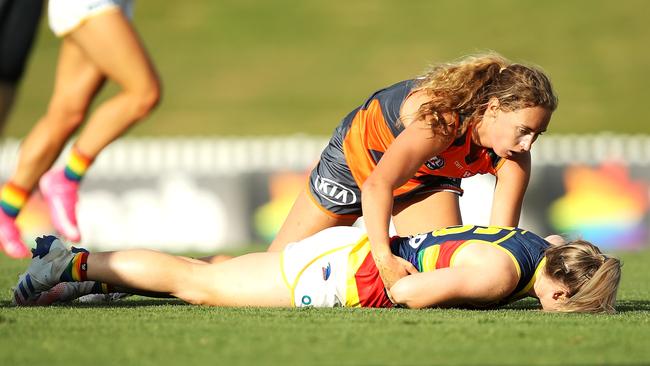
The 28-year-old Gaelic Football recruit detailed her injury for RTE Sports in Ireland.
“It’s a complete blank to me,” she wrote.
“I was awake and there in person … I had no idea where I was when I was sitting on the bench. I was trying to figure it out by looking at the sponsors around the oval.
“I worked out I was in Sydney, but I hadn’t a clue how I got there, what I did that day or anything. It was a complete blur.”
In January, the AFL announced it was tightening its mandatory concussion protocols, so that all AFL and AFLW players would be sidelined for a minimum 12 days after suffering concussion, up from six days in 2020.
Considine was automatically ruled out for Round 3.
During that same game, Crows captain Chelsea Randall was also concussed when she received a front-on headknock to her temple in a contest.
It looked fairly innocuous to those around her and she didn’t notice it, and she’s had to re-watch the match to determine when and how it took place.
Except that her vision was suddenly blurred.
She continued to play, and even kicked a goal, while concussed.
“It was probably on me to realise that I had a little bit of blurred vision and I needed to tell someone,” she muses.
“But it's hard because you’re not thinking very clearly when you’re concussed.
“Once logic came back to me, I thought: ‘You need to get yourself off the field’.”
As soon as the game finished, she reported to the club doctor and failed her concussion test.
She was automatically ruled out for Round 3.
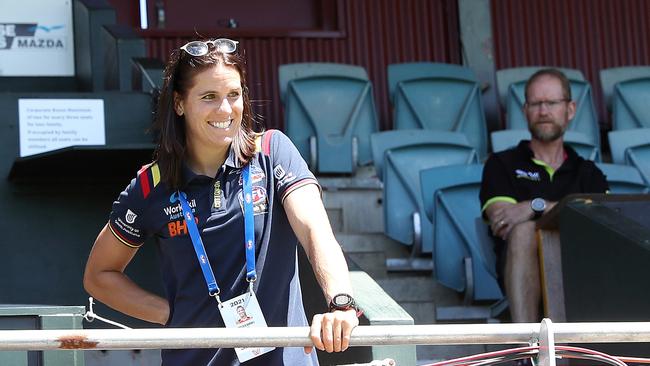
“Initially, as a player, you want to play as many games as you can and so the idea of missing a week was frustrating,” Randall says.
“However, I know how serious concussion is and that I’m the type of player who would force myself to try and get back as quickly as possible.
“This really took the pressure away … It was kinda nice having that ruling because it’s mandatory and you can just take the time to get yourself right.”
Carlton’s Vaomua Laloifi and North Melbourne’s Dani Hardiman have also had the 12-day period mandated on them during the first three rounds of the season.
The AFLW’s 2020 Injury Report was released last week, revealing that the women’s league’s concussion incidence (whether a match was missed or not) was relatively stable compared to previous years, with 11.6 per 1000 player hours in 2020, compared with 11.5 in 2019.
The report also found the number of matches missed due to concussion increased to 1.6 matches missed per club per season in 2020 compared with 0.5 in 2019.
Randall, now 29, says she’s had two or three concussions in her celebrated 25-game AFLW career, but she can’t approximate how many she’s had during her junior career at Swan Districts in WA.
“I asked my junior football coach: ‘Did I have any concussions?’. They said: ‘It was always hard to tell with you because you’d just bounce back up, and we’d ask if you were OK, you’d say: ‘Yeah, yeah, yeah, I’m fine’.”
RELATED: ALL THE ROUND 4 AFLW TEAMS AND TIPS
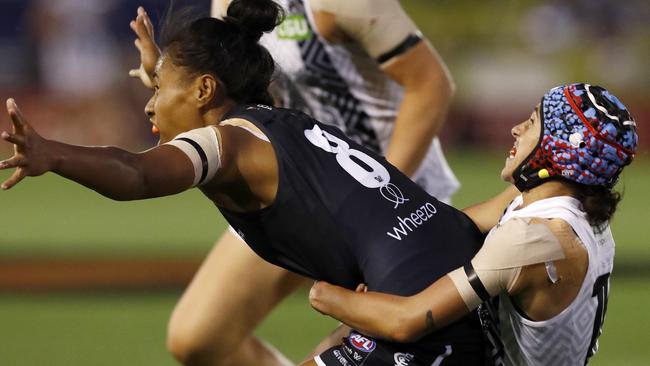
That “Yeah, yeah, yeah, I’m fine” mentality is rife in competitive sport.
Dr Alan Pearce is an Associate Professor at LaTrobe University’s College of Science Health and Engineering and is the Victorian research manager for the Australian Sports Brain Bank.
He says the AFL’s new protocols are a great first step in acknowledging that concussion is a brain injury, not just a knock to the head, but could go further.
He says the pressure for footy players to get back to playing as quickly as possible is a barrier to proper recovery.
“You’ve got 20 years, sometimes more, of this ingrained training that, as an athlete, you can run through walls and not show any weakness,” he says.
“It can be very difficult then for an athlete to suddenly go: ‘Oh, hang on, I think I might be concussed’.”
He says it’s different for other injuries: when a player tears their anterior cruciate ligament, they will crumple to the ground in pain; a torn hamstring will force a player to limp.
“Whereas a brain injury is hidden inside the skull, so people don’t necessarily appreciate how serious the injury is,” he says.
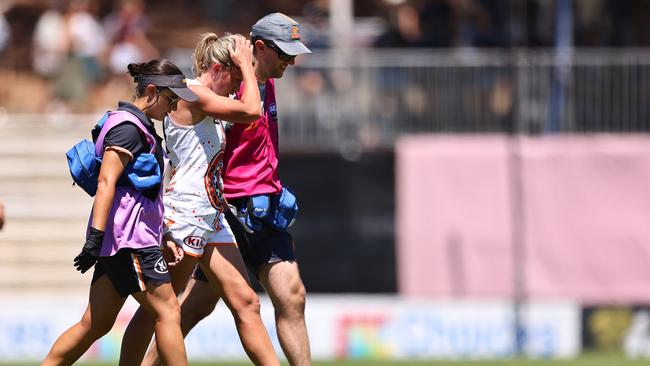
Pearce says it might be time too, to progress the concussion tests themselves in which a player goes through a battery of memory tests in the pre-season to establish their base.
He says the “worst kept secret in football” is where players deliberately answer questions slowly to set themselves a lower base.
He says there are tests available that can read a brain’s waves through a magnetic pulse that cannot be influenced in any way through pre-testing.
He also says a risk exists with a mandatory stand-down that a player could under-report symptoms so they could play in a must-win game the following week, like a grand final.
“That’s the reason we need to have more objective markers to determine if a player is concussed or not, rather than relying on self-report,” Pearce says.
Crow’s major concern over new concussion protocols
Crows premiership-winning AFLW coach Matthew Clarke has thrown his support behind the AFL’s tougher new concussion protocols, despite them meaning two of his stars were forced to sit out his side’s Round 3, 30-point loss to Fremantle on Sunday.
In January, the AFL announced it was tightening its concussion protocols, so that all AFL and AFLW players would be sidelined for a minimum 12 days after suffering concussion, up from only a six-day mandatory rest period in 2020.
While supportive of the policy, Clarke warned the challenge for the protocols would be to make sure players didn’t under-report any symptoms in light of the mandatory one-game sit-out.
Adelaide’s All-Australian captain Chelsea Randall and Irish import Ailish Considine were sidelined for the Dockers game, after both were concussed in the Crows’ Round 2 win over Greater Western Sydney a week earlier.
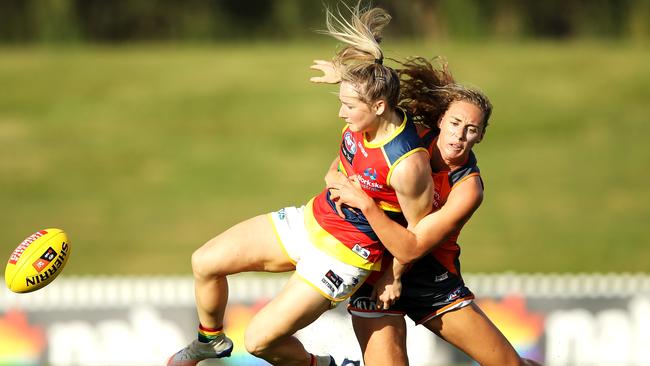
Gaelic Football recruit Considine, 28, was knocked out in the third quarter of the 47-point win after being tackled from behind by Giant Tarni Evans. Evans was banned for one match for a dangerous tackle for the incident.
Considine failed to pass a concussion test after being taken from the ground and could not return to play.
Randall, 29, received a head knock, also in the third term of the Round 2 match, and continued playing and did not experience concussion symptoms until after the game.
Clarke said Randall notified medical staff immediately after the game that she had symptoms.
“Chels reported to the doc after the game that she just wasn’t feeling great and then subsequently was diagnosed with a bit of delayed concussion, so she just went into the protocol of 12 days,” he said after Sunday’s loss to Freo.
“I think in many respects it (was) disappointing for us to not have her out here (in Round 3), but it’s probably not a bad thing because it takes any grey out of it … ordinarily we probably would have been pushing pretty hard to the line, or she would have been, to try to be available.
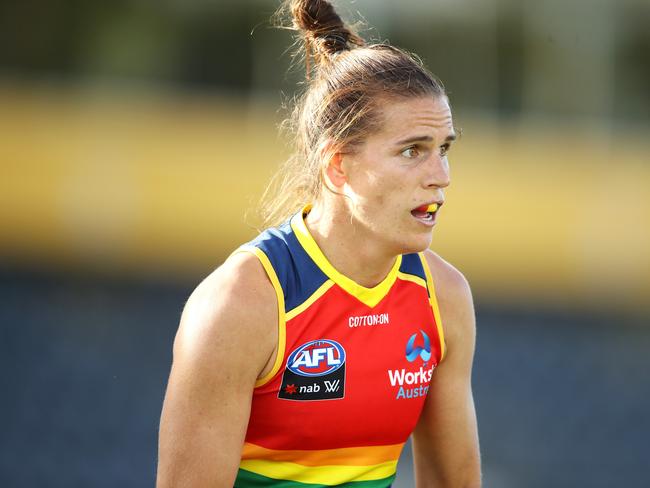
“The new protocol meant there was no question. So she gets a full recovery and we’re confident she’ll progress really well and ultimately that’s probably an example of the system working OK.”
Clarke said he was comfortable with the protocol changes.
“The challenge point will be to make sure there’s no incentive to under-report initially, but … once it’s clear they have been concussed I think that little bit extra time just takes all the pressure out of it and makes it really clear their wellbeing is the No. 1 priority, so the game becomes irrelevant ultimately,” he said.
“It will take a little bit of getting used to, but having just gone through it and having lost a pretty good player, I’m still pretty comfortable with that, that it’s not a bad way to go.”
Pies player self-reports visit to COVID hotspot
Collingwood has dodged a COVID scare after a women’s player self-reported she had visited hotspot at Melbourne Airport on Tuesday, February 9.
The Magpies AFLW player has been COVID tested and returned a negative result, but is still serving out 14 days of home quarantine.
A Pies spokeswoman said the player, who is understood to not have played any AFLW games so far this season, had not had contact with anyone at the club since Monday, February 8 and she immediately informed the Department of Health as required by current Victorian Government guidelines.
“As a part of routine testing, all Collingwood players and staff were tested on Friday, February 12 and each returned a negative result,” the spokeswoman said.
“The health and safety of the player and everyone involved in the football club, along with the wider community, remains the priority and both the player and broader club will continue to be led by the Government and public health officials.”
Collingwood would not name the player who is expected to return to training on February 24.
The self-isolation is a precaution for anyone who has visited an exposure site in Victoria.
The AFL has had to fixture its AFLW season on the run this year because of a number of COVID lockdowns across the country.
Games were played in Melbourne across the weekend without any crowds.
The league has once again fixtured Victorian clubs to play against each other in this weekend’s Round 4 matches.
The preference is adopt a fly-in/fly-out model to finish the nine rounds of the home-and-away competition and keep the prospect of hubs as a last resort.
Non-Victorian AFLW teams will fly across the country this weekend in the remaining matches.
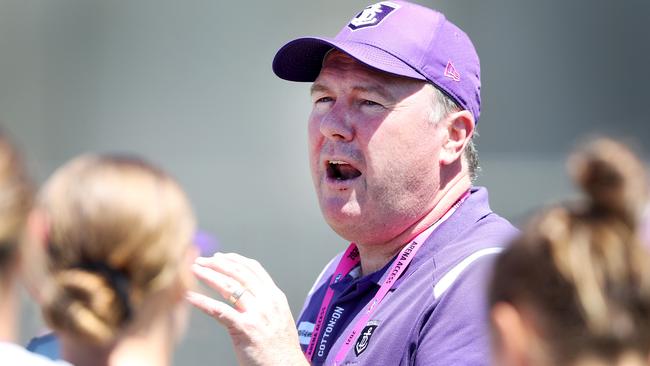
Fremantle coach Trent Cooper said his side arrived in Adelaide last Friday prepared to play three games on the road, most likely hubbed in Queensland and was shocked they weren’t.
“I have to get my head around it, we were more than happy to play our block away here, and we’d planned for that … I trust the AFL will be doing the right thing and thinking further ahead to make sure we’re getting the season away,” he said.
“The (players will) just roll with the punches; that’s what we saw in the men’s comp, that those sides who took on the challenges the best, were the ones who performed the best and we want to make sure we don’t have anything outside of our control influence the way we play.”
But Crows coach Matthew Clarke said hubs did not suit part-time footballers with other work commitments.
“In a semi-professional environment with players who have jobs and other employers that they need to look after, so as much as possible we can fly-in/fly-out will be to the betterment,” he said.
Originally published as AFLW: Despite the AFL’s new concussion protocols being put under the microscope, Carlton coach Daniel Harford has defended a dangerous-looking tackle




